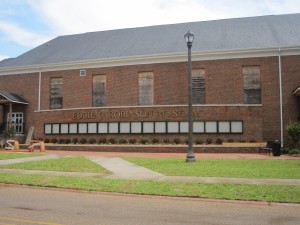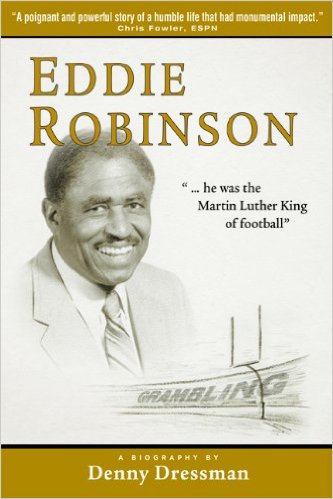aNewDomain — A weird small bookstore opened up in Littleton, CO this year, called Local Editions. It only stocks books by Colorado authors, and it does so by book title rather than genre, author and so on. I paid them a visit earlier in the year and picked up four books I might otherwise never have heard of, never mind read. A small selection with covers out really broadened rather than narrowed my choices.
— A weird small bookstore opened up in Littleton, CO this year, called Local Editions. It only stocks books by Colorado authors, and it does so by book title rather than genre, author and so on. I paid them a visit earlier in the year and picked up four books I might otherwise never have heard of, never mind read. A small selection with covers out really broadened rather than narrowed my choices.
One of the books I picked up was a biography of Eddie Robinson by sports journalist Denny Dressman.
Now, the opening pages of this book invite us to consider whether it is appropriate to call Eddie Robinson the Martin Luther King of Football – that’s a reference to the perhaps controversial subtitle on the cover. College and professional sports might seem, to the modern reader, to be a place where integration has already happened, where black athletes already dominate.
Short-sighted trolls going after affirmative action have even made the claim that we won’t have equality until there are more white players on college football teams.
 Robinson discouraged his players from taking part in civil rights marches, sit-ins, and other demonstrations. He wanted them to focus on their studies. Buckle down, get good grades, earn your degree, make every practice. He had a spectacular graduation rate as well as a truly impressive list of NFL hires, draftees, and hall-of-fame inductions. He did something very, very right.
Robinson discouraged his players from taking part in civil rights marches, sit-ins, and other demonstrations. He wanted them to focus on their studies. Buckle down, get good grades, earn your degree, make every practice. He had a spectacular graduation rate as well as a truly impressive list of NFL hires, draftees, and hall-of-fame inductions. He did something very, very right.
His philosophy was that every American could succeed if they worked hard enough. He never talked race or civil rights, just instructed his players that times were changing, and the new world would need new people. He wanted them to be ready for the opportunities that people like King and X would afford them.
King wondered aloud what good it was to have the right to sit at the lunch counter if you couldn’t afford a sandwich. Robinson wanted to prepare young men to be able to enter the integrated working world, not just as football players but as Americans, with college degrees.
When I picked up the book, I expected I’d get another if-you-believe-then-you-can-achieve story, blind to the real inequalities and inequities that belie this notion. Hard work does not lead directly to success; it is neither necessary nor sufficient. People get to success mostly by being white in a world of white privilege, born into money and afforded opportunity. The cream doesn’t rise to the surface. This guy does.
 And sports stories lend themselves to such ignorance. We can focus on Robinson but ignore all the other black men of his time who wanted to do more than load farm trucks for a few cents a day. We can look at Usain Bolt but look away from the endemic poverty of his island home. Point to Kobe Bryant and Michael Jordan but away from the millions of poor kids trying to practice their way out of their neighborhoods without the support, infrastructure or plain good luck to really make it.
And sports stories lend themselves to such ignorance. We can focus on Robinson but ignore all the other black men of his time who wanted to do more than load farm trucks for a few cents a day. We can look at Usain Bolt but look away from the endemic poverty of his island home. Point to Kobe Bryant and Michael Jordan but away from the millions of poor kids trying to practice their way out of their neighborhoods without the support, infrastructure or plain good luck to really make it.
Dressman, though, is not blind to these kinds of issues. I find myself reading more and more biographies these days because of writers like Dressman, who are careful to contextualize the lives of the subjects in their time and place. Robinson was good – but he was also lucky.
Dressman carefully examines all the factors and tells more than a Rudy story, a story of greatness meant to occlude our view of racial inequality in America. Instead, he uses Robinson to highlight the major issues openly and honestly.
Amidst the football statistics are the economic and social ones. Among the stories of wins on the field are the tales of the battles fought to make those wins possible.
Far from being disinterest in the protest movement, Robinson just enacted his strategy on a grander timeline in a narrower field. His efforts to integrate football at all levels led to profound and sweeping social changes.
Was he the Martin Luther King of football? Well, he didn’t go to jail, he didn’t have a congregation, he didn’t get his home firebombed. He didn’t spend hours a day listening to death threats. So, possibly not.
Football is maybe not the place to find a King. But that does not make Robinson unimportant. He did the work he could do in the context he created, and that work was substantial.
Congratulations, Mr. Dressman, on a compelling and honest tribute to one of sports’ most magnificent figures.
For aNewDomain, I’m Jason Dias.
Cover image: Amazon.com, All Rights Reserved; image one: By Billy Hathorn (Own work) [CC BY-SA 3.0 (http://creativecommons.org/licenses/by-sa/3.0) or GFDL (http://www.gnu.org/copyleft/fdl.html)], via Wikimedia Commons; image two: Brobible.com, All Rights Reserved.













